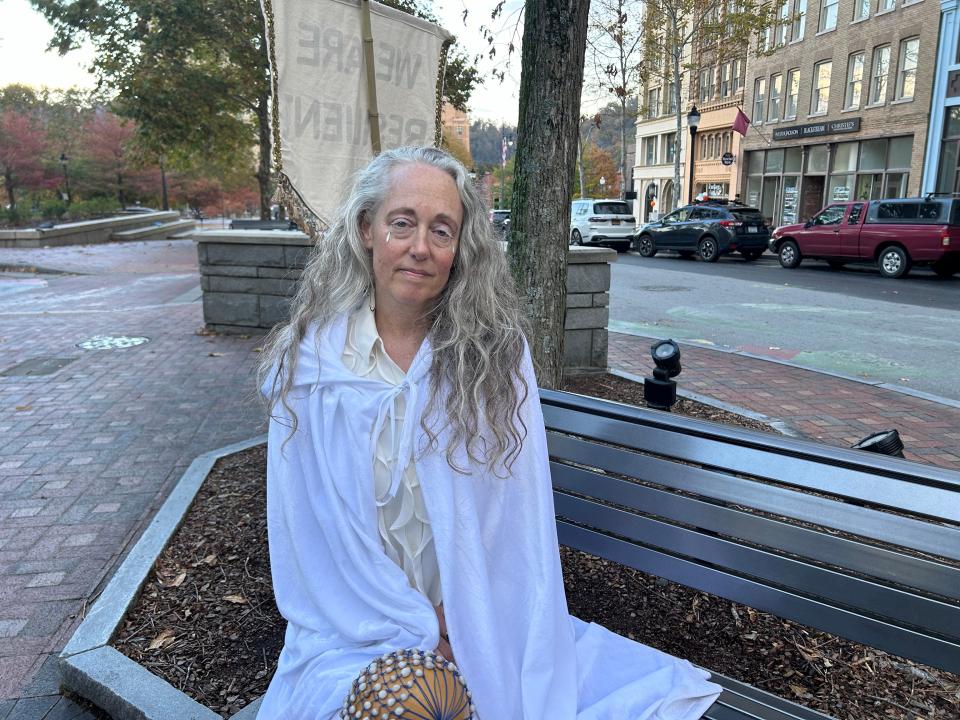Messages of hope, love and encouragement are everywhere in downtown Asheville.
One month after Tropical Storm Helene swept through Western North Carolina, groups of costumed bike riders, friends catching up and gatherings of grief and celebration could be seen around downtown.
Tropical Storm Helene destroyed homes, uprooted infrastructure and left at least 98 people dead, but despite the destruction and loss, residents said an overwhelming sense of community connection and support has emerged.
On Oct. 26, a Citizen Times reporter walked through Asheville’s downtown, speaking to residents and asking them to reflect on what has stuck with them from the past month, what worries them about the future and what brings them hope.
Asheville residents process grief after Helene

Jenna Jaffe, an artist who lives in East Asheville, spent a portion of the afternoon at the Surreal Sirkus Arts Festival in Pack Square Park, where people could join in a community ritual, express their feelings at a grief altar and celebrate local arts.
She said the storm has brought layers of grief and loss.
“I feel a lot of grief and sadness,” Jaffe said. “The loss is so enormous and devastating.”
Phillip Presnell, 36, a West Asheville resident, recalled biking past DayTrip, a bar that opened at the end of August on Amboy Road and was destroyed by the storm.
“I had zero ties to this bar, but it made me really emotional, and I started crying,” Presnell said. “Just like, having the realization that that’s gonna happen 10,000 times.”
Because of the loss of cell service and road closures, many had no idea how much had been destroyed by the storm. Presnell and others said it was striking to realize that the destruction they’d seen was only a fraction of the impact.
How people learned about Helene’s dramatic impact on Asheville

Simone Matthews, 34, of Leicester, said the moment that’s stuck with her the most was the “shock” when cell service returned and she realized how bad the storm had been.
“We were shut out there for a minute, and had no idea how bad things actually were,” she said. “When you finally had service, and you’re like, ‘Oh my word, I had no idea what was happening.’”
Eleanor Koch, 26, of South Asheville, said a battery-powered radio was their only connection to the rest of the world for a few days.
“I don’t want to ever live without a radio again,” Koch said. “We just started walking places and trying to figure out if anywhere had generators or stuff like that, or food, water, but the 10 a.m. and the 4 p.m. broadcast kind of held us through.”
The twice-daily storm recovery updates by Buncombe County officials were crucial for Koch.
Cade Justad, 27, said he was stuck at his Richmond Hill Park home for two days before he could get out.
When he finally left, he went to Craven Street Bridge and after seeing the river, decided to leave. Four hours later, though, he was home again, because there was no way to get out.
“We just didn’t know how bad it was, because we lose power normally up there during a storm,” he said. “And then I saw everything underwater. And I was like, ‘Oh, that’s everywhere right now.’”

Survivors recount storm experiences
Seairra Davis, 23, of Leicester, was driving to her grandmother in Hot Springs as the storm hit. She said parts of the road were “completely destroyed,” and she watched a landslide begin behind her.
“It was like a perfect luck event to not be hit by the landslide and pushed off the mountain,” Davis said.
Shelby Arnett, 27, who was sitting with Presnell and Justad at a table outside Asheville Club at Haywood Street and Battery Park, lives in Swannanoa.
Before Federal Emergency Management Agency personnel arrived to provide outside help, she had loaded up her car with supplies and started driving them around to people.

She built relationships with people she was visiting, some of them multiple times. Arnett recalled one such visit.
“People just wanted to be remembered.” Arnett said. “She started to cry, because she just was happy to see me, knowing I had stuff for her, and also that I was checking on her again.”
Helene leaves many in precarious financial circumstances

Davis’ grandmother, who has a trout farm, lost 15,000 fish because of the flooding and loss of power. They couldn’t get any reimbursement because FEMA wasn’t able to come see the conditions, Davis said.
“We had to pull all the dead fish out to keep the living ones still alive, to make some sort of profit off them,” she said.
Koch said the storm has thrown their financial situation into chaos.
Two of Koch’s housemates were planning to move out, and the two new people they found to move in decided not come after the storm.
“That meant that I was without housemates, I couldn’t afford my house, there wasn’t electricity,” Koch said. “It’s just a really stressful time figuring out, am I gonna get kicked out of my apartment?”
A long road ahead for Asheville recovery
Matthews is the owner of Whisp, a downtown gift shop.
“The thing I’m most concerned about is the businesses getting back on their feet, as well as the people that have lost so much,” she said. “Asheville in general, getting back together, rebuilding and moving forward, how long that’s going to take.”
The storm’s impact on the tourism industry is a big concern for many.
Koch said they’re worried the lack of tourism will further strain their finances.
“I finally got to start work this week,” Koch said. “I don’t know if it’ll be stable, because it was a retail place, very heavily dependent on tourists.”
Others, like Jaffe, are worried there isn’t enough funding and resources for Asheville to recover.
“I’m wondering how we get rid of all these trees that are everywhere.” Jaffe said. “I don’t know if there are enough grants that can cover the money that people are losing from this.”
‘Don’t forget about us’

Justad, said he’s worried people over time will stop recognizing this is a long-term crisis facing Asheville and environs.
“I’m concerned people won’t view it as an emergency six months from now,” he said. “If we miss a tourist season — that’s when most people make most of their money — how do you make Asheville work?”
Laura Vickers, 59, and her husband Dan, moved to Asheville two years ago to escape wildfires on the West Coast. Now, she said she’s worried Asheville is being forgotten as it moves into a rebuild phase.
“We’re just very thankful for the outside help, and keep it coming,” Vickers said. “Don’t forget about us. It’s gonna take a long time to rebuild.”

Community resilience encourages hope
Seeing people coming together despite their differences and building mutual aid networks has brought hope to many Asheville residents.
Matthews, the Whisp owner, said she’s been inspired to see how much everyone has been supporting each other.
“Artists posting GoFundMe’s for each other, and going out there and helping each other, going to Swannanoa, everybody really getting together and helping, has been pretty cool to see,” Matthews said.
Koch added that although their mom has been encouraging them to move home to Nashville, they’re reluctant to leave.
“I want to be here, even if financially, that would probably be the smartest decision for me,” they said.
“I want to be part of this community, going forward and rebuilding.”
Isabel Funk is a visiting breaking news reporter from the Statesman Journal in Salem, Oregon. Funk is assisting Citizen Times journalists with coverage of the aftermath of Tropical Storm Helene.
This article originally appeared on Asheville Citizen Times: Asheville Strong: 1 month after Tropical Storm Helene, a sense of hope
EMEA Tribune is not involved in this news article, it is taken from our partners and or from the News Agencies. Copyright and Credit go to the News Agencies, email news@emeatribune.com Follow our WhatsApp verified Channel




